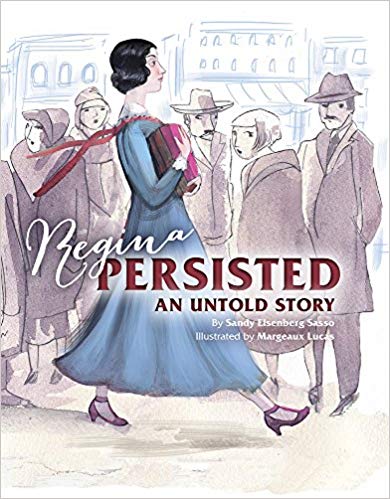Title: Regina Persisted: An Untold Story
Author: Sandy Eisenberg Sasso
Illustrator: Margeaux Lucas
Publisher: Apples and Honey Press
Intended for Ages: 7-12 years
Jewish Topics: Jewish History, Torah Study, Biblical Women
Additional Topics Mentioned: women’s rights, persistence toward one’s goals, overcoming obstacles (Note that there is a short mention of the Holocaust, and the book’s afterword explains that Rabbi Jonas died in Auschwitz.)
Synopsis
Regina Jonas was the first woman to be ordained as a rabbi, in Germany in 1935 – but her path to the rabbinate was not easy.
From a young age, Regina enjoyed learning and teaching about Judaism. Even as she attended synagogue and holidays with her family, people would tell her that religious leadership was no place for a woman. She studied for her rabbinical exams but was turned away numerous times by her teachers who told her that women could not be rabbis.
But Regina persisted in teaching, especially to groups of women and girls who she inspired with her love of her subject and her love of her students. Finally, her teachers saw how dedicated she was, and she was allowed to take the test to become a rabbi.
Highlights
- Persistence is a vital quality in a leader, especially for women. Regina had so much working against her, from society’s expectations to people in her own community. She continued studying, teaching, and doing what she loved despite so many around her telling her to stop, to move on, to take on traditional women’s work.
- We can imagine how devastated she must have felt after being rejected by her beloved teachers, who built her up as a teacher but would not allow her to take the final step and become a rabbi. Regina believed that women could serve as rabbis just as well as men, and she fought to make this a reality – a lesson for all of us when we see injustice in the world.
- Regina was inspired by her family to make many of her life choices. Her father was the one who originally inspired her love of learning and who taught her, in a time when most people didn’t teach their daughters. After he died, she continued learning in his name and to preserve his legacy.
She also attends synagogue with her brother and mother, continuing to be connected to the community even after her father’s death. Both her mother and brother supported her journey, and she was deeply connected to them throughout her life. - Regina’s story ends in tragedy and then is largely forgotten by the wider Jewish world – but her fight and her legacy survive in the form of more than 1,000 female rabbis who serve our Jewish communities today. This book helps us to reclaim her story and understand how her legacy and persistence changed the face of the Jewish world forever.
Jewish Topics for Family Discussion
At the end of this book is a wonderful family discussion guide, written by the author. She asks about dreaming, about not giving up and about finding ways to follow through, even when things get hard. These are great questions to discuss as a family.
- Limmud – Jewish Learning: Regina wanted to become a rabbi because of her great love of Jewish learning. There are so many different ways your family can incorporate that into your lives. Read a summary of the weekly Torah portion together, read books from PJ Library® or other sources about Jewish holidays, or go to events hosted by local synagogues and JCCs in your area to celebrate with other families.
- Women in Judaism: Oftentimes, the stories of women in our tradition are overlooked – and indeed, many people have never heard the story of Regina Jonas, or many other women in our history. Regina talks about the Biblical figures of Esther, Deborah, and Miriam – and there are so many more stories to uncover.
- The Jewish Women’s Archive is a wonderful resource for learning all about Jewish women, from the time of the Bible until today; they even have a lot of additional material on Regina Jonas. See if you can find a Jewish woman whose story your child relates to. For older children, you can discuss with your child why women are often left out of history and how they might incorporate stories of women not just in their Jewish education but in all their schoolwork.

